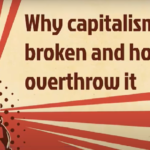Capitalism relies on imperialism, and both systems may be in trouble
For centuries the capitalist system has survived by exporting its problems away from the rich, imperial core countries to the peripheries of the empire. Every year, resources flow from the developing world to the developed world.
In this manner the voting populaces of the core countries are kept happy, voting capitalists into power year on year, and supporting the maintenance of vast imperial armies. As the peoples of the developed world are physically very remote from their cousins in the core, their suffering is unseen by those with the most power to stop it, and capitalists can get away with gross abuses in the marketplace and during foreign interventions.
The peoples of the developing world are not, however, powerless, and their rise in the coming decades may bring the capitalist system to its knees. The struggles of the developing world through 18th, 19th and early 20th centuries led the imperial powers to abandon the use of formal colonies; officially granting the developing worlds it’s independence.
Independence however has not meant a fundamental change in the relationship between the imperial core and its former colonies. The developing world seeks long-term sustainable growth that provides for all it’s people, while the imperial core seeks a source of cheap resources and labour.
Where possible imperialist nations prefer to avoid open conflict, so first they try negotiations, tricking developing nations into accepting reforms that serve their interests. Developed nations may offer aid in exchange, or to lower tariffs on trade. John Perkins, in his book ‘Confessions of an economic hitman’ speaks of his job as an engineering consulting where he was employed to trick developing countries into taking out large loans which would primarily benefit his own company. Developing nations that are less susceptible to trickery may be threatened with crippling tariffs, or may be deliberately pushed into debt, then forced to comply in exchange for debt relief. As a last option imperialist nations may use espionage operations or military intervention to topple a government and replace it with one more amenable to them.
Once a developing nation accepts corporate reforms it can find its political sovereignty quickly disappearing, as foreign companies use their resources to swing the nation’s internal elections, putting in place neoliberal politicians who further privatise the nation’s economy, and create poverty to scare the populace into working at extortionate wages.
A populace can only be suppressed though for so long before it rebels. During the Cold War; when Russia and China offering their aid in defense of developing nations; many took the opportunity to carve out a path of their own, including Cuba, Ghana, Cambodia, Ethiopia, and dozens more. Many socialists were hopeful that the Cold War would see the end of Capitalism, but ultimately not enough nations got onboard, and too many socialist governments were corrupted, or deposed. With the collapse of the Soviet Union in the 90s, the Cold War wound down, with capitalism seeming to be the victor.
The collapse of the soviet Union however only spelled a temporary break in the socialist conflict. Seventeen years later, the world was shocked by the Great Recession, highlighting again the failure of capitalism to provide real progress, and triggering a new wave of rebellion across the planet. The developing world is beginning again to challenge the capitalist world order, and has several advantages it lacked before. The populaces of the developing world have become much more educated in the last few decades, less vulnerable to deception, better able to organise themselves, and make the transition to a pluralistic democratic socialist society. The developing world has had decades to build up its infrastructure and technology, and is better able to survive and thrive without support from capitalist nations. The world is also a much more connected place, with the internet expanding across the globe, and rapid transit growing. It’s much easier now for distant developing countries to support each other, and harder for imperialist nations to get away with abuses unnoticed by their own people.
The geopolitical order has always changed dramatically. With strategic investment and planning, China came through the Great Recession unscathed, and in 2014 China overtook the US, becoming the world’s largest economy, if the relative cost of goods and services is taken into account. China has it’s problems, but remains formally committed to the advance of socialism, and has begun investing heavily into Africa nations, offering an alternative to imperial control.
In a study issued this year, the Pentagon noted that the U.S.-backed international order established after World War 2 is ‘fraying’ and may even be ‘collapsing’, with a significant risk of more ‘Arab Spring’ style events, that pose a threat to american interests, erupting all over the world [1]. The first eruptions have emerged in Latin America, where the Revolutionary Bolivarian Movement spearheaded by Hugo Chavez has erupted into a ‘Pink Tide’ of popular resistance and Latin-American unity. Likewise in the middle-east; Kurdistan has emerged; a modern reinvention of Social Ecology and Democratic Confederalism, attempting a more libertarian socialist vision for society.
The 21st century is due to be one of huge change. Futurologists speak of mass automation and a world without work. The astronomer Carl Sagan described this time as the ‘technical adolescence’ of humanity, while the physicist Michio Kaku talks of humanity as transitioning to a ‘type 1’ civilisation, also known as a Planetary Civilisation. If we are entering a new era of globalisation, technology and a renewed investigation of what it means to be human, then the old imperialist structures may well not survive long. As developing nations rebel and reject the system imposed on them, the flows of cheap resources to the developed world will stop, and the populaces of the imperial core will rebel themselves, in a global revolution that will mark the end of capitalism, and the birth of a more democratic and egalitarian world order.
[1] https://medium.com/insurge-intelligence/pentagon-study-declares-american-empire-is-collapsing-746754cdaebf



“China has it’s problems, but remains formally committed to the advance of socialism, and has begun investing heavily into Africa nations, offering an alternative to imperial control “
Surely China offers a variation of imperial control. It in no way offers an alternative or in any way progressive ‘ development strategy ‘